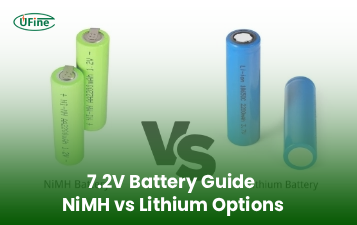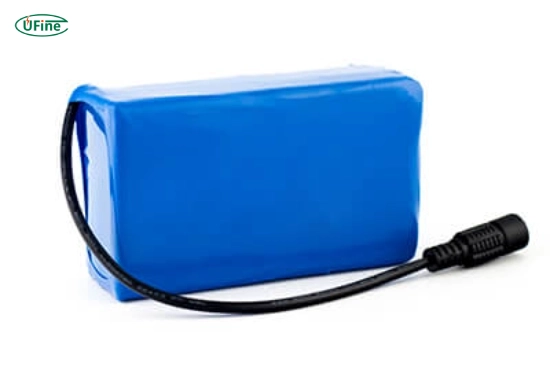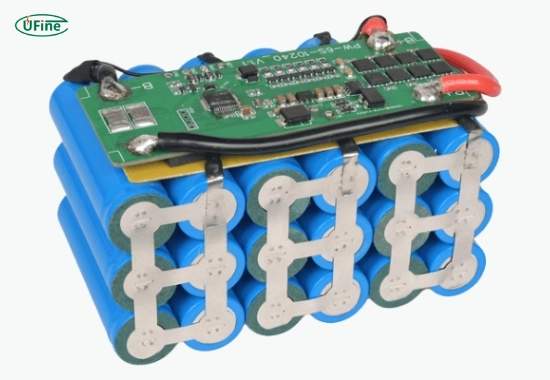
- Part 1. What is a small LiFePO4 battery and what makes it special?
- Part 2. Why choose a small LiFePO4 battery over other battery types?
- Part 3. How to determine the right capacity for your small LiFePO4 battery?
- Part 4. Choosing the right dimensions for your small LiFePO4 battery
- Part 5. Understanding the price range of small LiFePO4 batteries
- Part 6. What is a BMS and why your small LiFePO4 battery needs one?
- Part 7. What voltage should you choose for a small LiFePO4 battery?
- Part 8. How to evaluate the quality of a small LiFePO4 battery
- Part 9. Can you connect small LiFePO4 batteries in series or parallel?
- Part 10. What are the best small LiFePO4 battery brands to consider?
- Part 11. FAQs about small lifepo4 battery
How to choose the right small LiFePO4 battery is one of the most important questions for anyone working with portable power systems. Whether you’re powering a solar installation, RV, backup system, or an electric scooter, a small LiFePO4 battery offers excellent performance, safety, and long-term value.
In this detailed guide, we’ll explore how to choose the right small LiFePO4 battery by focusing on capacity, dimensions, and price. You’ll learn what to look for, how to match a battery to your needs, and which features matter most. If you’re unsure which battery to buy, this article will help you make a confident decision.
Part 1. What is a small LiFePO4 battery and what makes it special?
A small LiFePO4 battery is a compact lithium iron phosphate battery typically ranging from 6 amp-hours (Ah) to 100Ah. These batteries are smaller in size and lighter than traditional lead-acid batteries, yet they offer much higher reliability.
What makes LiFePO4 batteries unique?
- Long cycle life: Up to 5000 cycles with proper use
- Excellent thermal stability: Reduced risk of overheating
- Consistent voltage output: Ideal for sensitive electronics
- Lightweight design: Easier to transport and install
- Eco-friendly composition: Non-toxic and recyclable
They are commonly used in systems where space and weight matter. Think small solar setups, electric mobility devices, portable power stations, and marine electronics.
Part 2. Why choose a small LiFePO4 battery over other battery types?
Choosing a small LiFePO4 battery over alternatives like lead-acid or nickel-metal hydride batteries brings multiple advantages.
Here’s why LiFePO4 is often the superior choice:
- Lifespan: LiFePO4 batteries commonly last 5 to 10 years, significantly longer than lead-acid batteries.
- Efficiency: Their energy efficiency exceeds 95 percent, reducing electricity waste.
- Depth of discharge: You can safely use up to 90 percent of their capacity, compared to 50 percent in lead-acid batteries.
- Fast charging: They accept higher charge currents, completing charging in less time.
- Stable voltage: They maintain consistent power output, which is crucial for electronics and sensitive equipment.
These benefits make them especially well-suited for off-grid applications, electric tools, and modern renewable energy systems.
Part 3. How to determine the right capacity for your small LiFePO4 battery?
What battery capacity do I need? This is one of the most frequently asked questions when selecting a small LiFePO4 battery.
Capacity is measured in amp-hours (Ah) and it tells you how much energy the battery can store. Choosing the right capacity ensures your devices run as expected without overloading or under-powering your system.
Steps to calculate required battery capacity:
- List all devices you plan to power.
- Note each device’s power usage in watts.
- Estimate daily usage time of each device.
- Convert watts to amps using the formula: Amps = Watts ÷ Volts
- Multiply amps by hours of use to get amp-hours per device and add them up.
Example:
- A 12V fan using 24W for 5 hours
→ 24 ÷ 12 = 2 Amps × 5 hours = 10Ah - A 40W LED light for 4 hours
→ 40 ÷ 12 = 3.3 Amps × 4 = 13.2Ah - Total = 23.2Ah
- Add 20 percent safety margin → 23.2 × 1.2 = 27.84Ah
- Recommended capacity = at least 30Ah
Choosing the right capacity ensures battery longevity and performance.
Part 4. Choosing the right dimensions for your small LiFePO4 battery
Why do battery dimensions matter when selecting a small LiFePO4 battery? Because space is often limited in vehicles, boats, or portable systems.
Before buying, always check:
- Battery length, width, and height
- Available installation space
- Clearance for ventilation and wiring
- Orientation requirements (some batteries can be mounted in any direction)
Typical small LiFePO4 batteries are compact, but not all models have the same shape. Some are designed for horizontal mounting, others for vertical positioning. Always measure twice before purchasing.
Also, keep in mind the terminal placement and type of connectors needed. This ensures seamless integration with your equipment.
Part 5. Understanding the price range of small LiFePO4 batteries
How much does a small LiFePO4 battery cost? The price depends on capacity, brand, features, and build quality.
Average price range for small LiFePO4 batteries:
| Capacity (Ah) | Typical Price (USD) |
|---|---|
| 6Ah – 20Ah | $40 to $90 |
| 30Ah – 50Ah | $100 to $200 |
| 60Ah – 100Ah | $220 to $550 |
Factors affecting price:
- Built-in BMS (Battery Management System)
- Bluetooth monitoring
- Low-temperature charging protection
- High discharge current capability
- Brand reputation and warranty
While you may find cheaper options, investing in a reliable and certified battery pays off long-term. Cheap batteries often lack safety certifications, leading to performance and safety issues.
Part 6. What is a BMS and why your small LiFePO4 battery needs one?
A Battery Management System (BMS) is a critical component inside modern LiFePO4 batteries. It acts as the battery’s internal monitoring system.
The BMS protects your battery by:
- Preventing overcharging and over-discharging
- Managing cell balancing
- Providing short circuit protection
- Monitoring temperature and voltage levels
Without a BMS, the battery is at risk of damage or failure. A quality BMS ensures the battery operates safely and efficiently across its lifespan.
When shopping for a small LiFePO4 battery, always check that it includes a smart BMS.
Part 7. What voltage should you choose for a small LiFePO4 battery?
Should you choose a 12V, 24V, or 48V small LiFePO4 battery? The right voltage depends on your system requirements.
- 12V batteries are the most common and ideal for small systems like camping gear, RVs, and portable solar setups.
- 24V batteries are more efficient for medium-sized solar systems or power tools.
- 48V batteries are better suited for high-demand systems such as home energy storage or large electric vehicles.
For most small-scale applications, 12V is the best choice due to its simplicity and compatibility with standard devices and inverters.
Part 8. How to evaluate the quality of a small LiFePO4 battery
Before purchasing, evaluate the battery’s quality using this checklist:
- Cycle life: Look for batteries rated for 2000+ cycles
- Certifications: CE, UL, RoHS, or UN38.3
- Warranty: At least 2 years is recommended
- User reviews: Check for positive feedback from verified buyers
- Battery specs: Clear technical datasheets should be available
- Built-in features: BMS, Bluetooth, or low-temperature protection
Avoid batteries with vague descriptions, no brand name, or no customer support. Quality matters more than just price.
Part 9. Can you connect small LiFePO4 batteries in series or parallel?
Yes, most small LiFePO4 batteries can be connected in series or parallel, depending on your voltage or capacity needs.
- Series connection: Increases voltage. For example, two 12V batteries connected in series give you 24V.
- Parallel connection: Increases capacity. Two 12V 50Ah batteries in parallel give you 100Ah at 12V.
Important precautions:
- Use identical batteries of the same brand, model, and age
- Fully charge all batteries before linking
- Use proper cables and fuses
- Follow the manufacturer’s series/parallel connection guidelines
Never mix different battery types or capacities. This can lead to imbalance and shortened battery life.
Part 10. What are the best small LiFePO4 battery brands to consider?
When choosing a small LiFePO4 battery, brand reputation plays a key role in ensuring quality, safety, and support.
Top brands offering small LiFePO4 batteries:
- Battle Born Batteries: Known for excellent build quality and customer support
- Renogy: Offers a wide range of solar-compatible batteries
- Ampere Time (LiTime): Popular for its cost-effective and reliable batteries
- Dakota Lithium: Premium pricing but great performance and warranties
- Bioenno Power: Focused on lightweight and compact applications
- Ufine Battery: A rising player that offers highly customized LiFePO4 battery solutions with MOQ as low as one unit, making it ideal for startups, DIYers, and low-volume projects
Ufine Battery stands out by allowing deep customization in voltage, capacity, shape, and features. If you need a battery tailored to your exact application, they are a strong option to consider.
Part 11. FAQs about small lifepo4 battery
Can I safely replace a lead-acid battery with a small LiFePO4 battery?
Yes, most small LiFePO4 batteries are drop-in replacements for lead-acid batteries, especially 12V models. Just ensure your charger is lithium-compatible.
How long can a small LiFePO4 battery last?
With proper care, a quality small LiFePO4 battery can last 3000 to 5000 cycles, or up to 10 years in typical use.
Do I need a special charger for charging small LiFePO4 batteries?
Yes, it’s best to use a LiFePO4-compatible charger. These chargers ensure correct voltage and charge profile to protect the battery.
Can I use a small LiFePO4 battery in cold weather conditions?
Yes, but with caution. Charging below 0°C (32°F) can damage the battery unless it has low-temperature charging protection or built-in heaters.
How should I store my LiFePO4 battery when not in use?
Store at around 50 percent charge, in a cool and dry place. Recharge every 3 to 6 months to maintain battery health.
Related Tags:
More Articles

NiMH vs Lithium 7.2V Battery and Charger: Which Is Better?
Compare 7.2V NiMH vs Lithium batteries and chargers in 2025. Learn runtime, weight, charging, lifespan, and cost to choose the best for your device.
How to Choose the Right 7.2V Battery and Charger for Your Device?
Learn how to choose the right 7.2V battery and charger for optimal performance, safety, and longevity across RC, tools, medical, and industrial devices.
Big Square Battery Safety Standards You Must Know
Learn key safety standards for big square batteries to avoid fire risks, shipping delays, and compliance issues in EV, industrial, and energy storage projects.
Big Square Battery Applications in Solar & Industrial Equipment
Big square batteries deliver high capacity, stable output, and long life for solar, industrial, and backup power. Explore key uses and advantages.
Big Square Battery vs Cylindrical Battery: Complete 2025 Guide for EVs, ESS & Industrial Devices
Choosing the right battery is key for designers and engineers. Compare big square vs cylindrical batteries to find the best fit for your application.




